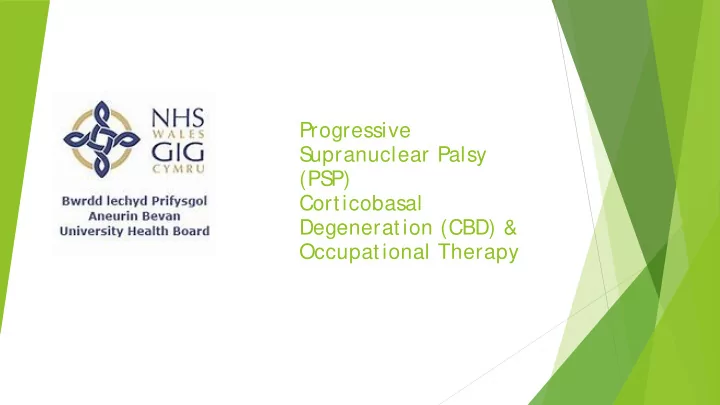

Progressive S upranuclear Palsy (PS P) Corticobasal Degeneration (CBD) & Occupational Therapy
What is Occupational Therapy? “ Occupational therapy provides practical support to empower people to overcome barriers preventing them from doing the activities (or occupations) that matter to them. This support increases people's independence and satisfaction in all aspects of life” RCOT What do occupational therapists’ do? “ Occupational therapists help people of all ages overcome the effects of disability caused by illness, ageing or accident so that they can carry out everyday tasks or occupations” RCOT
How can an OT help people with PS P , CBD and their carers? Managing the functional impact that the symptom of the condition have on the individual and their carers: Everyone is different Everyone has different values and priorities S ocial and environmental situation is unique S trategies and techniques Equipment Adaptations Condition specific education
Occupational Therapy & Physiotherapy – Often confused! OT will look at your condition based on your occupations and work to improve you participation or satisfaction in the occupations. Physiotherapy will look at things from a different perspective. They will look at how the condition has affected your strength, range of movement, balance and posture and work with you to improve these through exercise, orthotics and mobility aids. Physiotherapists and occupational therapists work closely with each other to help you achieve the goals you set. If you feel you are not seeing a physiotherapist and feel you should be, your OT can help you access Physiotherapy.
S ome activities you may have difficulty with: Walking Dressing S Washing tairs and steps Overwhelming Fatigue Getting on/ off bed, chair, toilet, car seat Feeding and drinking Making meals and drinks Reading/ TV Memory Hobbies
How an OT may help you Home assessment and S eating and posture assessments – recommendations wheelchairs and specialist seating Grab rails and hand rails Moving and handling assessment and equipment Bathing equipment Advice regarding use of technology Maj or adaptations Car transfers Dressing aids Fatigue management education Kitchen equipment and aids Adaptation of hobbies and leisure Adapted cups and cutlery activities
Educat e Assess Telecare Environment Falls Teach Communit y S t rat egies Alarms Work wit h Physio
Environment Rout ines S eat ing Eating and Drinking Prism Post ure Glasses Ut ensils
Environment Memory Techniques Prompt s
Fatigue Management Activity Rest Activity Rest Boom & Bust Fatigue = poor concentration, increased falls, errors, lack of enj oyment Rest, Relaxation, deep breathing techniques and Mindfulness – Managing anxiety
Questions?
Natalie Jones Team Lead Occupational Therapist – Community Neurology Aneurin Bevan University Health Board Natalie.j ones@ wales.nhs.uk
Recommend
More recommend